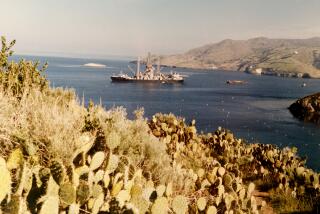Is Competition a Neater Way to Do ‘Covert’?
- Share via
The proposal of the late William J. Casey, director of the Central Intelligence Agency, for the creation of a free-standing, self-financing, eventually self-destructing covert-action agency is an idea with a lot of possibilities. This proposed new “company” has not yet been named. Let’s call it “CIA North” to distinguish it from the existing covert-operations agency, “CIA South.” As a “private,” free-floating entity it would provide the ultimate in deniability. Certainly nobody would need to tell the President.
It’s easy to see how such a company could be much more efficient than CIA South. As Lt. Col. Oliver L. North demonstrated, for example, there is no need to subject recruits for covert operations to a lengthy and costly security-clearance process. The only need is to establish that such personnel have a well-developed capacity for lying. That could be determined with a simple lie-detector test, as it was for Manucher Ghorbanifar. Anyone who has made a mint in used cars or the televangelism business could be given an automatic clearance.
North and his associates have already developed creative approaches to financing such an activity. There would be other possibilities. For example, the new company might conduct a national lottery, with the winners having the choice of playing freedom fighter for a day or of participating in a simulated missile attack on the Soviet Union at the headquarters of the Strategic Air Command.
Consider the innovative possibilities for operations. A private covert company might establish a small bakery. Then, when we want to bake a cake for an Islamic leader, we wouldn’t be dependent on a local Israeli bakery, as were Col. North and Robert C. McFarlane.
We have tried to stay neutral in the Iran-Iraq war by alternately helping each side. That has got us into some difficulty as we switch back and forth. With two companies, CIA North could support one combatant, CIA South the other. The profits on arms sales to one side could be used to support the war effort of the other. That way we could fine-tune the conflict, keeping things on an even keel at no cost to ourselves. With imagination, we should be able to develop a variety of such “off-the-shelf” policy packages as Director Casey apparently contemplated.
An important source of error in American foreign policy has been the tendency to take U.S. defense commitments altogether too seriously--a mistake that we made in Vietnam. This problem could be avoided if we turned commitment-making over to the new company. It could undertake commitments on a wholly unattributable and deniable basis, as retired Gen. Richard V. Secord did on behalf of Col. North in negotiations with Iran when he generously offered U.S. support against an attack by the Soviet Union. Such deniable commitments would be disposable, and could be disowned once they had served their immediate purpose.
On a more serious level, if the covert operators needed a small nuclear weapon for a secret operation, they wouldn’t have to go through cumbersome U.S. bureaucratic procedures to get one. They could simply arrange for a transfer from the implausibly deniable Israeli stockpile with the understanding that we would later replenish Israel’s non-existent inventory from U.S. stocks. The ultimate operation would be a nuclear war conducted entirely in secret--an important point, since, as Oliver North repeatedly emphasized, secrecy is essential to protect lives.
More to Read
Sign up for Essential California
The most important California stories and recommendations in your inbox every morning.
You may occasionally receive promotional content from the Los Angeles Times.










